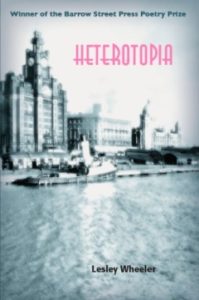 Review by Amy Watkins
Review by Amy Watkins
– Heterotopia, according to philosophers, is a real or imagined place of escape, transformation or reflection. If I tell you that the Heterotopia of Lesley Wheeler’s prize-winning poetry collection is Liverpool, England, the setting of her mother’s childhood, you will likely expect a book of nostalgic musings, but that’s not the book Wheeler has written. It is a book about memory and language, about what is remembered, forgotten or repressed, but rather than reflective elegies or escapist reminiscences, the poems in Heterotopia are clear-eyed, specific and transformative artifacts.
Take for example “Sunday Afternoon in Liverpool, 1950,” a poem so jammed with details you can practically feel the damp cold in the house and the adolescent ennui of the teenaged speaker:
[…] Fifth in line
for the crossword, I glare for a while
at the tangled chains four times erased,
yank the bow from my hair, sink into bed.
Gray. I know how to float away […]
The erased and re-erased crossword is a real, unsentimental, undramatic detail that tells us all we need to know about the younger child who’s ready to “knock the coal soot from [her]shoes.” Wheeler is fantastic at finding these telling details. In poem after poem, she gives us litanies of specifics and almost always one in particular that ties it all together.
Those are the details that imbue the Liverpool of the past with noise and life enough to resonate naturally through the last section of the book, in which Wheeler moves her readers to the present day United States. She writes about teaching language classes and missing the expressions her family used to use. In “Her Voice in My Mouth,” she writes of her mother’s accent and phrasing, “I feel them / as phantom limbs […] The room / of my mouth remains full of ghosts.” In “Oral Culture,” she writes, “I remember dialects changing as the blender whirred, / suitcases emptied,” and later in the same poem, “Listen to the foam of my voice and I will pour it for you, / all the tiny stories.” There’s a sense of loss in these poems, but it isn’t self-indulgent or even particularly nostalgic; the past feels present in the poems and in the poet.
Because the past and its language is a part of the poet, Lesley Wheeler’s Heterotopia is not a murky, distant land to be idealized. She’s made it a real place, one we can happily visit. She sums up her unsentimental approach in the next to last poem of the book: “No elegies here.”
Heterotopia by Leslie Wheeler
Amy Watkins is a poet, essayist and artist. Please visit her blog, http://www.redlionsq.com.
